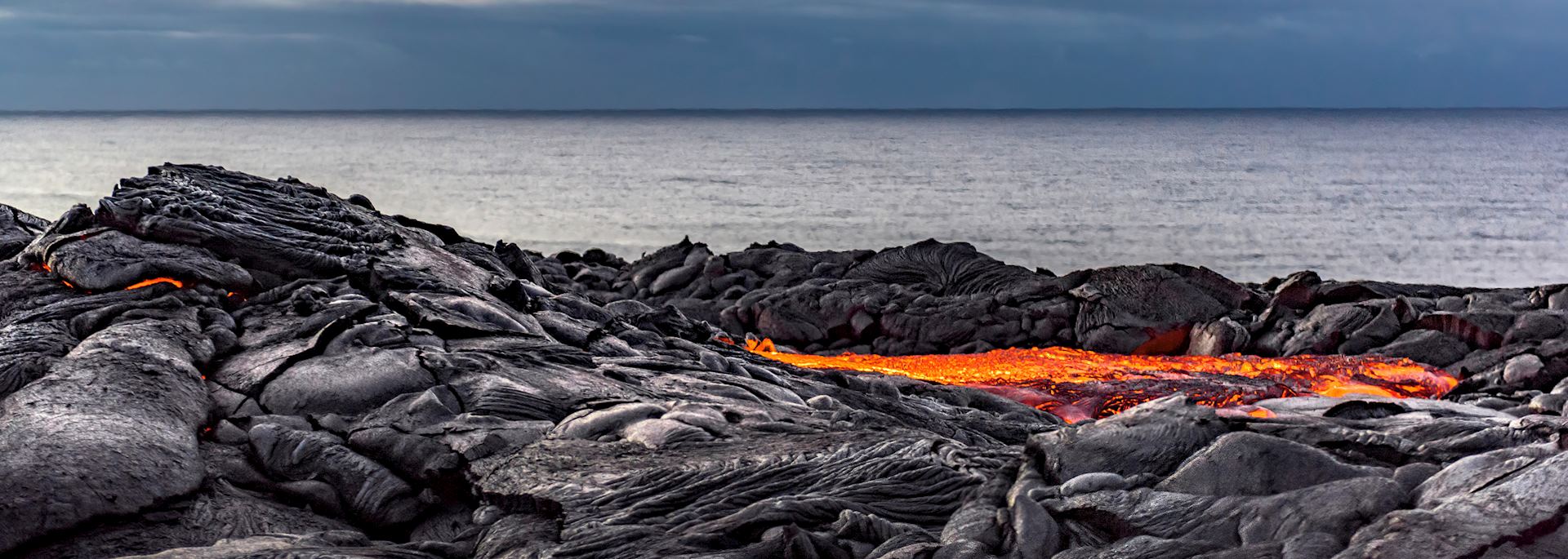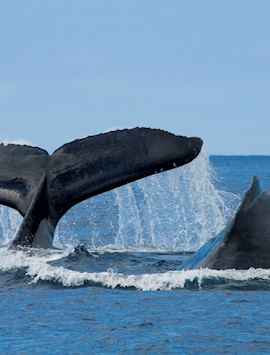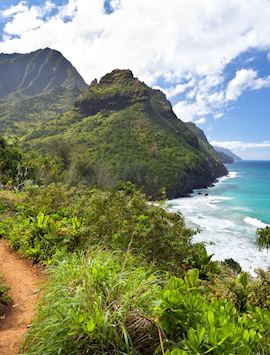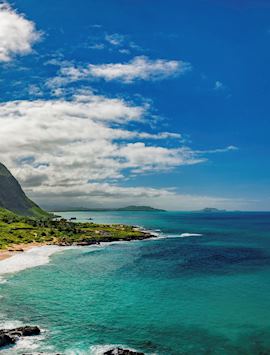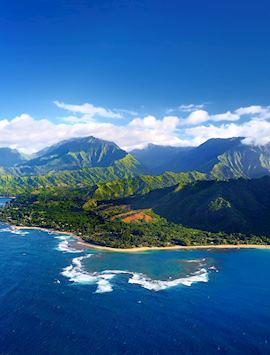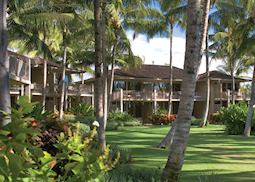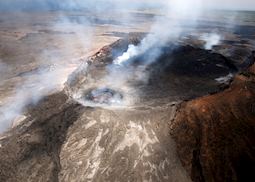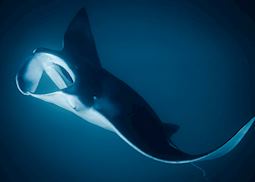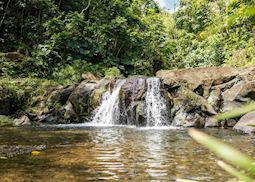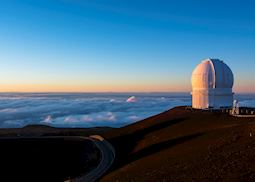Jump to:
The island of Hawai驶i (sometimes referred to as 'Big Island') is the largest, most recently formed of the Hawaiian islands, and it has two distinct sides to it. To the east, Hawai驶i Volcanoes National Park dominates the landscape. Some of the most active volcanoes on Earth rise from swirling lava fields glowing with molten lava and dotted with hissing craters. You can explore on foot with a guide, following set trails.
On the island’s western side you’ll find coffee plantations, sandy coves tucked between foliage-draped cliffs (including the bay where Captain Cook died in 1779), and long sweeps of beach washed by clear waters ideal for snorkelling. Meanwhile, at the island’s heart, Mauna Kea is a dormant giant sloping up into the clouds. You can stargaze from its discovery-making observatory.
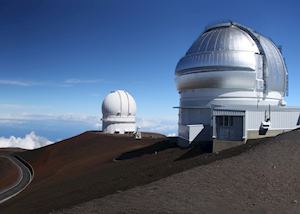 Attributing to more than half of the archipelago’s landmass but only 13% of its population, the island of Hawai驶i is wild and untamed. The focus here is on exploring nature. You can walk through moss-green rainforests to see wispy waterfalls and exotic birds. Drive along its coastline for views over sheer cliffs and turquoise waves. Or venture underwater to swim among kaleidoscopic marine life.
Attributing to more than half of the archipelago’s landmass but only 13% of its population, the island of Hawai驶i is wild and untamed. The focus here is on exploring nature. You can walk through moss-green rainforests to see wispy waterfalls and exotic birds. Drive along its coastline for views over sheer cliffs and turquoise waves. Or venture underwater to swim among kaleidoscopic marine life.
One marine experience that we suggest is snorkelling with manta rays. You head out by boat at dusk; special diving lights lure plankton to the surface, which in turn attracts the manta rays. You can then enter the water and snorkel among rays up to 7 m (23 ft) wide, their movements surprisingly graceful given their size.
It’s hard to ignore the huge dormant volcano that rises up from the middle of the island of Hawai驶i. The highest peak in the archipelago at 4,207 m (13,802 ft), Mauna Kea is one of the best places on the planet for stargazing. Astronomers based here discovered 11 of Jupiter’s moons from the volcano’s telescopes.
In the evening, you can ascend the winding road to the summit, driven by a local guide. After taking in views of the sun setting over a sea of clouds, you move down to the Visitor Information Station to gaze at constellations through the public telescopes.
Hawai驶i Volcanoes National Park
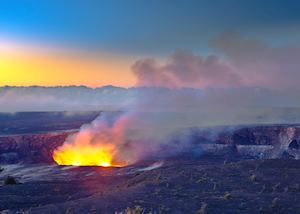 A charcoal-grey, volatile landscape that’s constantly changing, Volcanoes National Park is perhaps the main draw on the island of Hawai驶i. There aren’t many other places where you can walk past cinder cones, bubbling lava and vents angrily puffing out steam.
A charcoal-grey, volatile landscape that’s constantly changing, Volcanoes National Park is perhaps the main draw on the island of Hawai驶i. There aren’t many other places where you can walk past cinder cones, bubbling lava and vents angrily puffing out steam.
We can arrange for you to explore the park with a private local guide, who’ll tailor the day to your interests and tell you about the powerful volcanic forces that helped to create the island. You might drive down Chain of Craters Road to see where flowing lava crossed the road in 2003 or take a walk through rainforest to see a lava tube (formed when the surface of a lava flow cools and hardens and the liquid lava beneath is drained away, leaving a long, cave-like tube).
You also have the option to fly above the park on a one-hour helicopter ride. You’ll pass over lava flows, black-sand beaches, tropical rainforests and K墨lauea — the USA’s only constantly erupting volcano.
Best time to visit the island of Hawai驶i
The tropical climate on the island of Hawai驶i means any month of the year is a good time to visit. However, we particularly recommend visiting in June or September to avoid busier periods during school breaks.
who's been there

Start planning your tailor-made trip to the island of Hawai驶i by contacting one of our Hawaii specialists
-
01993 838 92501993 838 863
- Make an enquiry
Suggested itineraries featuring the island of Hawai驶i
Our itineraries will give you suggestions for what is possible when you travel in the island of Hawai驶i, and they showcase routes we know work particularly well. Treat them as inspiration, because your trip will be created uniquely by one of our specialists.
Photos of the island of Hawai驶i
Accommodation choices for the island of Hawai驶i
We've selected a range of accommodation options for when you visit the island of Hawai驶i. Our choices usually come recommended for their character, facilities and service or location. Our specialists always aim to suggest properties that match your preferences.
-
![Volcano House, Hawaii (Big Island)]()
Volcano House
island of Hawai驶i -
![Waikoloa Beach Marriott Resort and Spa, Hawaii (Big Island)]()
Waikoloa Beach Marriott Resort and Spa
island of Hawai驶i -
![Fairmont Orchid, Hawaii (Big Island)]()
Fairmont Orchid
island of Hawai驶i -
![Mauna Kea Beach Hotel, Hawaii (Big Island)]()
Mauna Kea Beach Hotel
island of Hawai驶i -
![Four Seasons Resort Hualalai]()
Four Seasons Resort Hualalai
island of Hawai驶i
Ideas for experiencing the island of Hawai驶i
Our specialists seek out authentic ways to get to know the places that could feature in your trip. These activities reflect some of the experiences they've most enjoyed while visiting the island of Hawai驶i, and which use the best local guides.
-
Hawaii Big Island private guided tour ![Volcanoes National Park, Hawaii]()
Hawaii Big Island private guided tour
Hawaii Big Island private guided tour
Accompanied by a local guide, you'll visit some of the island of Hawai驶i's volcanic sites on this private tour, as well as its beaches. The tour starts in Volcanoes National Park, viewing an active shield volcano, and can end on the coast.
View details -
Manta ray night snorkel ![Manta Ray Night Snorkel, Hawaii (Big Island)]()
Manta ray night snorkel
Manta ray night snorkel
As plankton rises to the water鈥檚 surface at dusk, watch beneath the waves as manta rays float gracefully in front of you to feed. In between snorkelling, your guide will be on hand to tell you more about the species.
View details -
Kohala waterfalls tour ![Watefalls]()
Kohala waterfalls tour
Kohala waterfalls tour
Discover the Kohala region on a guided tour featuring lush forests, cascading waterfalls, and historic sites. Ideal for nature lovers and adventure seekers.
View details -
Mauna Kea summit & stars ![Mauna Kea Observatory]()
Mauna Kea summit & stars
Mauna Kea summit & stars
Journeying to the summit of dormant volcano Mauna Kea for sunset, you can navigate the Hawaiian night sky by telescope under the expertise of your stargazing guide. On the way, you鈥檒l see the lava flows of the volcanically shaped landscape.
View details
